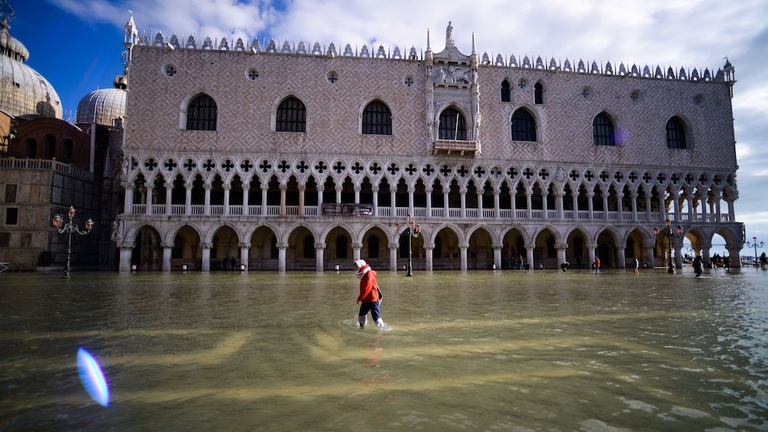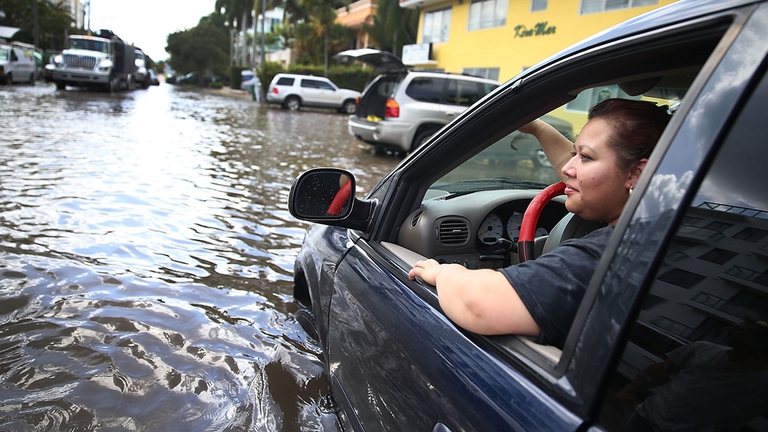
Rosebank and other fields would push the UK’s oil and gas industry almost 40 percent past its carbon budget
If we don’t turn the tide on global warming, cities like Venice and Miami will disappear under rising sea levels.
Rising sea levels are one of the consequences of global warming and according to recent estimates they could surge in excess of a metre by 2100 and up to almost six metres by 2300 (compared to the 1986-2005 period). If we don’t stop temperatures from rising by cutting down greenhouse gas emissions cities like Miami, New York, Bangkok and Venice will disappear forever. Entire nations, like the Maldives in the Indian Ocean and Kiribati in the Pacific, also face the same fate.
These dark predictions are the result of a survey conducted by researchers at Nanyang Technological University in Singapore in collaboration with experts from centres like the Potsdam Institute for Climate Impact Research. The survey involves 106 scientists, each of whom has published at least six peer-reviewed articles on the topic of rising sea levels since 2014.
The results of the study available from Climate and Atmospheric Science outline two possible scenarios. If average global temperature rise is contained within two degrees Celsius compared to pre-industrial levels, sea levels are expected to rise by 0.5 metres by 2100 and between 0.5 and 2 metres by 2300. If temperatures rise by 4.5 degrees, the increase is expected to be between 0.6 and 1.3 metres by 2100, and between 1.7 and 5.6 metres by 2300. These projections are even more serious than previous ones, including those made by experts from the UN Intergovernmental Panel on Climate Change (IPCC).
Read more: Kivalina, photos of the Alaskan village that could be gone by 2025
“The complexity of sea level projections, and the sheer amount of relevant scientific publications, make it difficult for policymakers to get an overview of the state of the science,” explains Professor Benjamin Horton, who led the survey. “To obtain this overview, it’s useful to survey leading experts on the expected sea level rise, which provides a broader picture of future scenarios and informs policymakers so they can prepare necessary measures“.
“Like in the Covid pandemic, timing is critical to prevent devastation,” states co-author Stefan Rahmstorf from the Potsdam Institute. “If you wait until you already have a serious problem, then it’s too late. Unlike with corona, sea level rise can’t be stopped for many centuries or even millennia once ice sheets have been destabilised past their tipping points”.
The most pressing concern is the ice in Antarctica and Greenland, the largest land masses covered in ice. The ongoing pandemic has reduced CO2 emissions worldwide, but restarting the economy shouldn’t coincide with a return to old polluting habits. Many cities, including Milan and London, are making commitments to promote sustainable mobility in the post-Covid era. And 231 experts including economist, banking experts, scientists and Nobel Prize winner Joseph Stiglitz assert that renewables create three times more jobs than fossil fuels. Our efforts should be aimed in this direction as we tackle the current crisis. Let’s not let this opportunity slip through our fingers.
Siamo anche su WhatsApp. Segui il canale ufficiale LifeGate per restare aggiornata, aggiornato sulle ultime notizie e sulle nostre attività.
![]()
Quest'opera è distribuita con Licenza Creative Commons Attribuzione - Non commerciale - Non opere derivate 4.0 Internazionale.
Rosebank and other fields would push the UK’s oil and gas industry almost 40 percent past its carbon budget
UN Secretary-General António Guterres said the era of global warming has ended and “the era of global boiling has arrived.”
The UN General Assembly (UNGA) on Wednesday, 29 March 2023, adopted a resolution seeking the International Court of Justice (ICJ), the UN’s chief judicial organ, which is also referred to as the World Court, for an advisory opinion on the duties of States concerning climate change. This decision marks the first time the World Court
Canada’s wildfire season this year is impacting air quality way beyond the borders of the North American state, reaching as far as Europe.
Wildfires in central and southern Chile, caused by extreme temperatures and drought, have already burned over 270,000 hectares of land.
Ocean heat content in the upper layers of our seas reached another record high in 2022, according to an international study published in January.
Increasing global average temperatures cause sea levels to rise and threaten the homes and livelihoods of many coastal communities in northern Europe.
After a landslide led to twelve deaths on the island of Ischia, questions have been raised about the impacts of illegal building, tourism, and climate change.
Santa Olalla, the last permanent lagoon in the park, has disappeared under the pressure of drought, overexploitation, and illegal wells.










